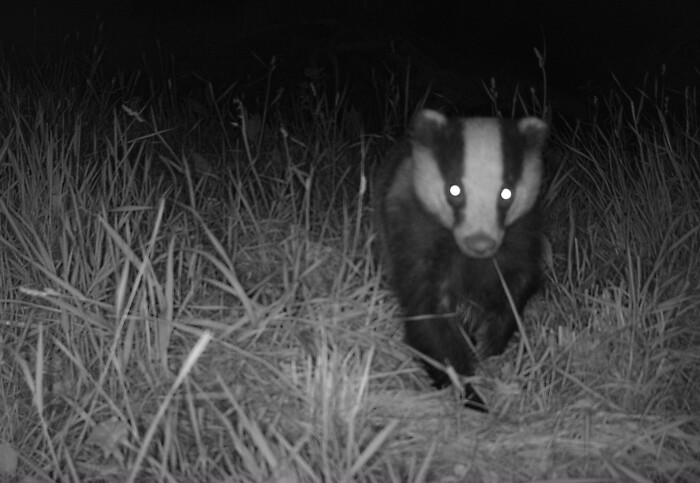Farmer-led badger vaccination could revolutionise mission to tackle bovine TB

A badger snapped in a camera trap for the study
A new study highlights the need for government support for large-scale badger vaccination to eradicate bovine tuberculosis.
The study, published today in People and Nature, reports on the results of a four-year pilot badger vaccination programme co-managed between farmers, scientists, and conservationists.
The findings show the percentage of badgers testing positive for bovine tuberculosis (bTB) in the study area dropped from 16% to 0%, while the farmers involved reported increased enthusiasm for badger vaccination as a bTB control tool.
I sleep better at night knowing that there are people out there working to eradicate the disease through vaccination. Keith Truscott Founder of the Mid Cornwall Badger Vaccination Farmers Group
The first-of-its-kind project was initiated by Cornish farmers and implemented by ZSL and Cornwall Wildlife Trust, with partners including Imperial College London researchers.
While most bTB incidents in cattle are caused by transmission between herds, transmission from wild badgers plays a role in the persistence of the disease. Badger culls have formed part of the UK government’s bTB policy for many years, although the new government has committed to ending the controversial cull.
With larger-scale assessments needed to measure how badger vaccination impacts disease rates in cattle, the team behind the study are calling on the government to support further evaluations of community-led badger vaccination.

Professor Rosie Woodroffe, project lead and researcher at ZSL’s Institute of Zoology said: “Bovine tuberculosis can devastate farmers’ livelihoods, and hundreds of thousands of cattle and badgers have been slaughtered for bTB control in recent years. Everyone wants to see this disease eradicated. Our hope is that this work will help to move bTB control into a place where farmers and wildlife groups can work together towards this shared goal.”
Effective vaccination
Initiated and funded by Cornish farmers, the team vaccinated badgers across 12 farms in an 11 square kilometre area, while simultaneously gathering data to address the farmers’ questions around the practicality and effectiveness of vaccination.
Verity Miles, a PhD researcher on the Science and Solutions for a Changing Planet Doctoral Training Partnership (SSCP DTP), studying at the School of Public Health at Imperial and at ZSL, gathered more than a million images from 1,460 nights of camera trapping to count the badger population.
Farmers who gave vaccination a go are really satisfied and glad that they did. Henry Grub
More badgers were vaccinated per square kilometre than were caught by nearby culls, with the camera data suggesting that 74% of local badgers received the vaccine.
Blood sampling showed that the proportion of badgers with bTB fell even though overall badger numbers remained high, and interviews with the participating landowners indicated their keenness to continue vaccination beyond the original four years.
Previously, plans to expand badger vaccination have been met with scepticism from farming leaders, concerned that vaccination might reach too few badgers, at too high a cost, making it ineffective. This new paper highlights that vaccination can be delivered in ways which are practical, cost-effective, and acceptable to farmers.

Henry Grub, also a PhD researcher on SSCP DTP, studying at the Centre for Environmental Policy at Imperial (supervised by Dr Caroline Howe) and at ZSL, interviewed the farmers involved. He said: “It’s really significant that we found the farmers’ enthusiasm for vaccination increased after the programme: farmers who gave vaccination a go are really satisfied and glad that they did.
“From our interviews, it’s clear this is in part down to transparently sharing the blood testing evidence with the farmers, and it shows that farmers are happy to use evidence to inform their opinions about vaccination.”
Protecting livelihoods and nature
Bovine tuberculosis is caused by the bacterium Mycobacterium bovis>/i>, and can affect people, as well as cattle, badgers, and many other mammals.
As part of the government’s commitment to eradicate bTB, cattle that test positive must be slaughtered, with restrictions placed on the remaining members of the herd – greatly impacting farmers’ livelihoods.
The paper, which includes three farmers as coauthors, also includes a summary in Cornish, thought to be the first use of this language in the scientific literature.
Keith Truscott, founder of the Mid Cornwall Badger Vaccination Farmers Group and senior author on the report said: “We need a solution to tackle bovine tuberculosis – as a cattle farmer, I’m living with the constant worry that one of our cows might test positive for the disease, so doing nothing is not an option.
“I sleep better at night knowing that there are people out there working to eradicate the disease through vaccination. I’m proud to be part of this project, and even more so to have instigated it.”
-
‘Farmer-led badger vaccination in Cornwall: Epidemiological patterns and social perspectives’ by Rosie Woodroffe et al. is published in People and Nature.
Based on a press release by ZSL.
Article supporters
Article text (excluding photos or graphics) © Imperial College London.
Photos and graphics subject to third party copyright used with permission or © Imperial College London.
Reporter
Hayley Dunning
Communications Division